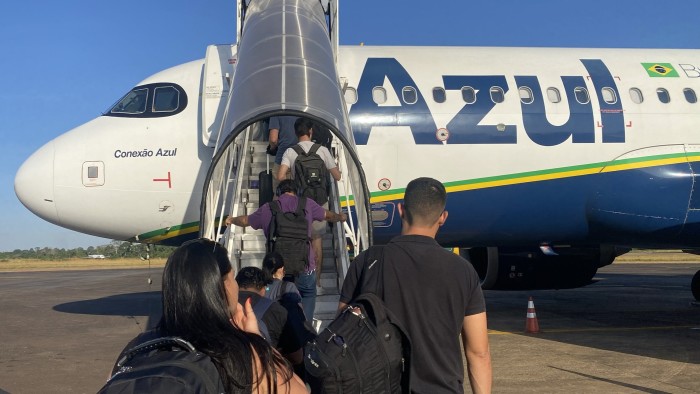The boss of Brazilian airline Azul has argued that its planned merger with rival Gol to create the country’s largest carrier will strengthen Brazil’s aviation industry and expand the number of routes on offer.
Chief executive John Rodgerson defended the tie-up as bolstering a sector still grappling with the financial fallout of the Covid-19 crisis, saying it would drive efficiencies and benefit consumers.
Azul-Gol would control about 60 per cent of the domestic market, giving rise to concerns about the potential impact on competition and ticket prices. But Rodgerson described it as a “merger of growth” that could increase the number of destinations served by Azul from 150 to 200.
“We can strengthen our balance sheet and connect a lot more people,” the American businessman told the Financial Times. “[It is an] opportunity to grow and to add more cities to the map, add more [flight] frequencies.”

He added that the deal, which will require regulatory approval, could even lower ticket prices in certain markets, “because we’re going to get more capacity up in the air”.
The proposed tie-up follows a difficult period for Latin America’s airlines. They received little direct financial assistance from governments during the pandemic, in contrast to the billions of dollars showered on US and European peers, leading many to skirt or fall into bankruptcy.
Brazilian carriers also complain that the country’s expensive jet fuel prices and widespread passenger lawsuits push up costs and fares.
Gol filed for bankruptcy last year, and is seeking $1.9bn of financing in order to exit Chapter 11 proceedings in the US, while Azul has struck out-of-court agreements with creditors to reduce its liabilities and unlock new funds. Latam Airlines, the region’s largest group, emerged from bankruptcy protection in late-2022.
Azul and Abra, Gol’s majority shareholder, signed a memorandum of understanding this month, agreeing to combine the companies into a single entity but continue to operate both brands separately.
Shares in the two groups have rallied, though they remain at a fraction of pre-coronavirus levels.
The new Azul-Gol would have combined annual revenues of some R$37bn ($6.2bn), based on 2023 figures, along with an overall net debt of about R$52bn, according to the latest filings. Rodgerson said it should have a reduced cost of capital and benefit from joint procurement.
Both airlines were given a boost this month when the government agreed to significant discounts on outstanding tax liabilities.
Industry watchers believe antitrust watchdogs may force the enlarged entity to cede landing slots at popular airports in order to obtain regulatory approval
Founded in 2008, Azul challenged the Latam-Gol dominance with a focus on smaller cities not served by other airlines. Rodgerson said the merging companies’ routes only overlapped by 10 per cent, adding that higher levels of market concentration were found in the UK, France, Canada, Korea, Germany and Chile.
The CEO suggested regulators could be appeased through “remedies of growth”, with extra flights added to certain locations.
The government of leftwing president Luiz Inácio Lula da Silva, which wants to make air travel more affordable and has pledged to support carriers, appears to be favourable.
Its ports and airports minister suggested ticket prices would not rise following the merger, which he said fell into a wider global trend of airline consolidation.
Rodgerson said he had discussed the idea of a merger last year with Lula. “I think he totally understood the logic [and] that we are a massive customer of Embraer,” the CEO said, referring to the Brazilian plane maker. “[Lula] wants to see more people travel. And so in that sense, our objectives are totally aligned.”
However, Rodgerson said that, regardless of the merger, ticket prices would need to rise in the short term following a slump in the Brazilian real, which has further pushed up the costs of kerosene and spare parts priced in dollars. These pressures have led Azul to close a dozen routes for the first time.
